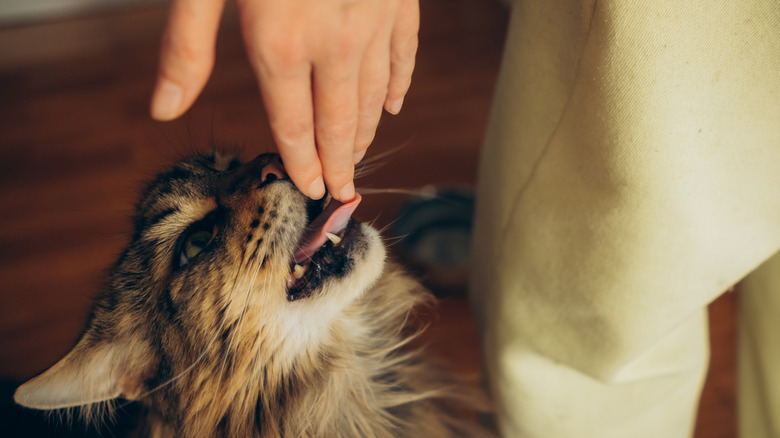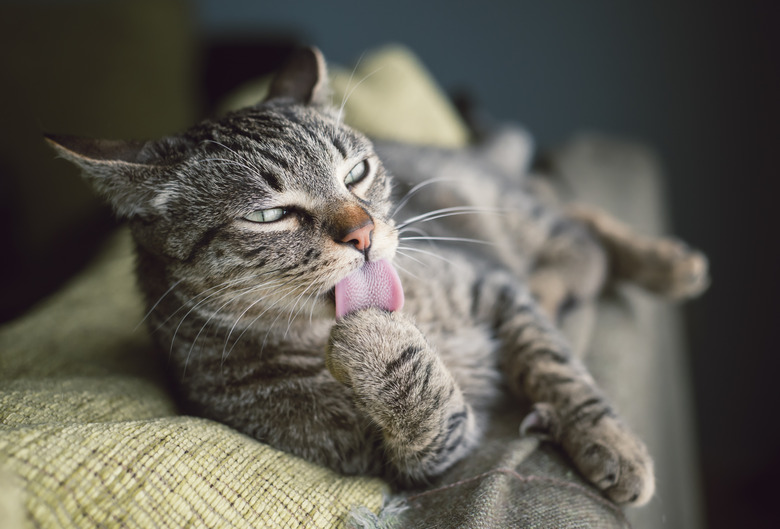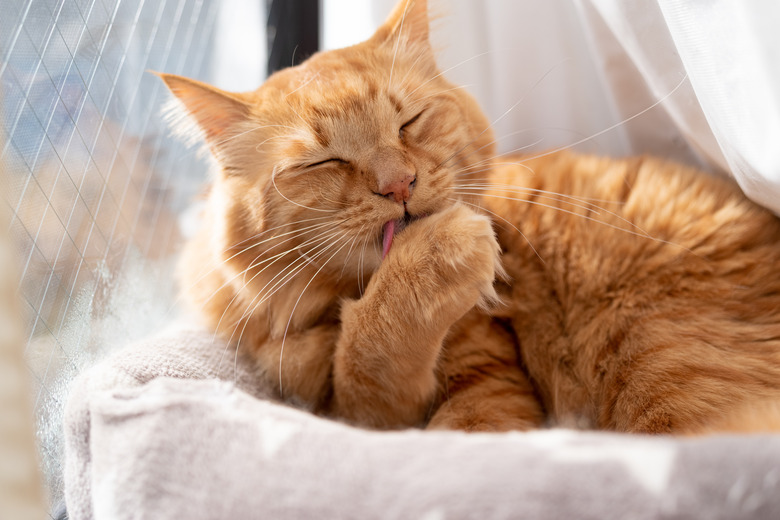Why Is My Cat Licking Things?
Cats are fastidious. That's one of the many reasons they grace the homes of millions of Americans. Cats often lick their human friends as a sign of affection. Elegantly draped across the sofa or lounging in the bay window catching up on their favorite bird show, not too many minutes go by without a cat's tongue licking a paw and then washing their face. Cats make licking and grooming into an art form. However, you know something is wrong when they start excessively licking and overgrooming.
While cats frequently lick and groom themselves, licking that becomes excessive or obsessive or that involves non-body, non-food items, such as a cat licking a blanket or a cat kneading with a blanket in their mouth, can be a sign of an underlying medical problem. Your cat could be suffering from a metabolic or physiological disorder or an obsessive-compulsive disorder, or they may be stressed by changes in the household. Cat owners can seek prompt attention from a veterinary professional, who can help you identify and treat your cat's unusual licking behavior.
Why is my cat self-grooming non-stop?
Your non-stop licker cat could have a condition called psychogenic alopecia, which can lead to hair loss. Female cats are more likely to exhibit excessive licking behaviors than males, with purebred, high-strung cats being most susceptible, especially Oriental breeds.
Cats generally develop this disorder as a way of self-soothing to help deal with stressors. A move to a new home, a change in litter box location, long-term guests, new pets, or new family members can all impact cats, who crave normalcy and routine in their everyday life.
Why is my cat licking nonfood items
Cats who lick obsessively at non-food items such as furniture, clothing, walls, plants, or household objects are exhibiting a form of pica. Pica develops when an animal craves the taste of nonfood items, and it is usually indicative of a metabolic or physiological disorder, most often anemia. Discuss your cat's dietary needs with your veterinarian to ensure your cat is getting the proper type of nutrients for their age, breed, size, and activity level. You may need to change your cat food as well. A pica cat who eats nonfood items also should be screened for feline leukemia, diabetes, and feline immunodeficiency virus.
What causes obsessive-compulsive disorder in cats?
Animals can develop obsessive-compulsive disorder just like people do. This mental ailment manifests in repetitive, compulsive behaviors and may be genetic or stress-induced. Changes to routine can kick behavior into overdrive, especially in cats who already have an anxious or nervous disposition. Your veterinarian may prescribe stress-reducing pheromones paired with household stress reduction to help alleviate the problem and stop it from recurring.
What are the medical causes for licking in cats?
Cats may lick their bodies if they are in pain, have an irritating skin condition, or are plagued by parasites, allergies, or fleas. Some medical problems that present with excessive licking and excessive grooming include anal sac problems, cystitis, and hyperthyroidism. Some neurological medical problems can manifest in excess licking, so a full medical exam can help your veterinarian determine the underlying cause of your cat's behavior.
What are the treatment options for cats?
1. Reduce stressors in your cat's environment.
2. Give your cats toys to create playtime when you can't be with them.
3. Provide safe havens where your cat can find peace and quiet away from other household pets and family members.
4. Keep litter boxes clean and avoid major changes in routine, if possible. If your cat is diagnosed with obsessive-compulsive disorder, you may be referred to an animal behavioral therapist to address the constant licking.
5. In extreme cases, your veterinarian may prescribe anti-anxiety medications such as selective serotonin reuptake inhibitors. There may also be alternatives to medication, so talk to your veterinarian if you want to explore those options.
6. Regular veterinary checkups can help to ensure your cat is in good overall mental and physical health.
The bottom line
Monitor your cat's licking habits and if you are concerned, consult your veterinarian to see if it could be due to an underlying metabolic or physiological disorder or anxiety. Watch for your cat licking everything, licking that becomes excessive, obsessive, or involves nonbody, nonfood items. If you do notice these behaviors, seek advice from your DVM to get to the root of the issue, get treatment if needed, and help your cat feel their best.


